Ukraine: ‘A shock for the world, a disgrace for Switzerland’
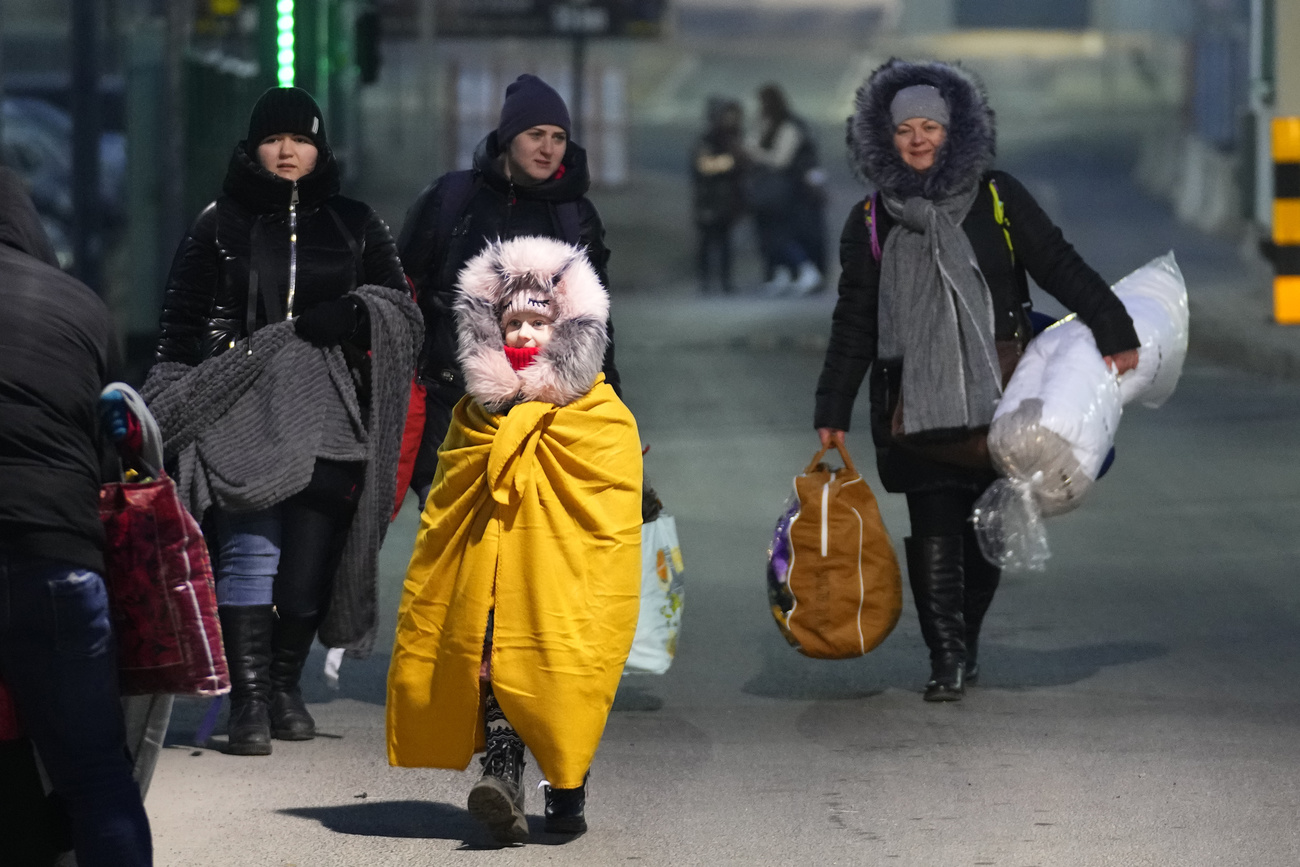
Newspapers within Switzerland and abroad are generally critical of the government’s decision to leave Russian bank accounts unfrozen and to not impose its own sanctions. Some papers, however, acknowledge that the government is walking a diplomatic tightrope, with potential benefits.
“The last chance for diplomacy – and for Switzerland” is the title of the editorialExternal link in the SonntagsZeitung, which said that if a ceasefire isn’t agreed within days, the Swiss must cut all business ties with Russia immediately.
“Of course it’s extremely unpleasant that Switzerland is once again taking its time with solidarity. And it was shameful to watch [Swiss President Ignazio] Cassis and his entourage trying to justify themselves on Thursday. It should go without saying that we join the free world and ban Russian President Putin and his corrupt entourage from our financial centre. It’s disgraceful enough that a third of Russia’s foreign assets are hidden in Switzerland and that 80% of Russia’s commodity trading is done through Switzerland,” it wrote.
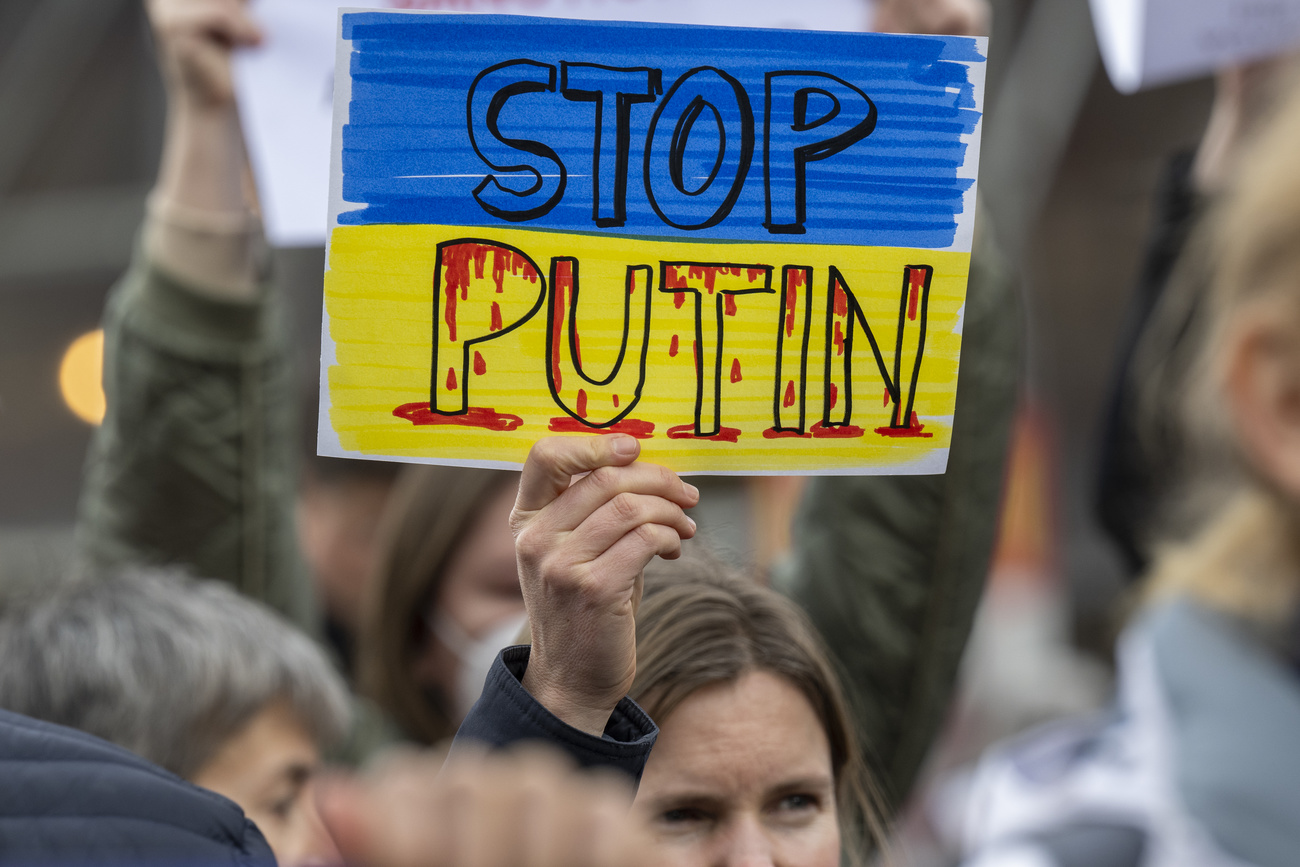
More
Switzerland faces pressure to toughen sanctions on Russia
But it pointed out that Switzerland isn’t only the country taking its time with sanctions, that Switzerland is the last country with a functioning embassy in Kyiv, and that Switzerland was the only country that helped on both sides of the ceasefire line in the Donbass in recent years when it came to everyday things such as maintaining the water supply. Also it was Switzerland that played a decisive role in brokering a ceasefire between the Ukrainian army and pro-Russian separatists in 2014.
“If Cassis actually succeeds in bringing the warring parties to the table on the fringes of the Human Rights Council meeting in Geneva next week, then all the embarrassment will have been worth it and the Swiss president will have earned the thanks of the Ukrainian president,” the paper wrote.
“If he does not succeed, then Switzerland’s time for dithering will be over and with it its business with the oligarchs. If the government doesn’t then quickly decide to impose sanctions, it will not only have earned whistles [as it did from demonstrators on Saturday], but it will have gambled away its credibility and the credibility of Switzerland.”
The Tages-Anzeigerreported on SaturdayExternal link that Ukrainian President Volodymyr Zelensky had asked Cassis to act as a neutral mediator between Ukraine and Russia and help work towards a ceasefire between the two countries, notably in the context of a Human Rights Council meeting in Geneva, which starts on Monday. The Swiss foreign ministry has not confirmed any such communication.
Need for a neutral actor
Le Temps in Lausanne agreed that while the optics aren’t good for Switzerland, there is a need for a neutral actor on the global stage.
“While the United States, the European Union and the United Kingdom are united in adopting economic sanctions against Russia, the Swiss cabinet’s wait-and-see attitude can only fuel the image of a greedy government that thinks and acts only in terms of its wallet,” it said in an editorialExternal link on Wednesday.
“But the issue is not economic, but diplomatic. However the situation develops, [Europe] needs more than ever a neutral actor capable of maintaining a semblance of a link with Putin. An intermediary who can represent, if need be, the interests of the belligerents or bring to the table the parties involved in a crisis, the outcome of which no one knows,” it wrote.
“Despite those who criticise its neutrality, Switzerland is now in a better position than anyone to try to [prevent the situation from flaring up]. By pounding the table, Brussels, London and Paris are playing their part; by playing for time, Bern is playing its part.”
‘Fatal mistake’
Blick was less willing to give the government the benefit of the doubt. “A shock for the world, a disgrace for Switzerland” was the headline of its editorialExternal link on Saturday.
“The free world stands united as never before at Ukraine’s side. Only Switzerland is hesitating – a fatal mistake for which there can’t be the slightest justification,” it wrote.
“And what does Switzerland say? That ‘war must not be a means of political conflict’? That ‘as part of the community of Western values, we naturally fully support the EU sanctions’? No. The authorities merely say, as if embarrassed, ‘tighter measures are planned with regard to preventing circumvention of the measures’.
“That was the statement of Cassis, his state secretaries and chief officials after the government sat for an extraordinary session. Switzerland hasn’t seen such a pathetic performance by its leaders for a long time. One had to be ashamed.”
It’s the same old story, the paper continued. “International pressure mounts, and when it gets high enough, Switzerland buckles, leaving behind the damage to its reputation.”
Blick also reckoned Switzerland should call off its candidacy for a seat on the UN Security Council. “A government that isn’t even capable of making clear decisions for its own country in the event of war – how can it find solutions for the whole world?”
For its part, the SonntagsBlickreported on SundayExternal link that a representative survey had found a narrow majority (51.6%) of Swiss favoured sanctions against Russia. Only 22% thought sanctions were not in line with Swiss neutrality. Almost three-quarters (72.5%) of respondents advocated taking in people seeking protection.
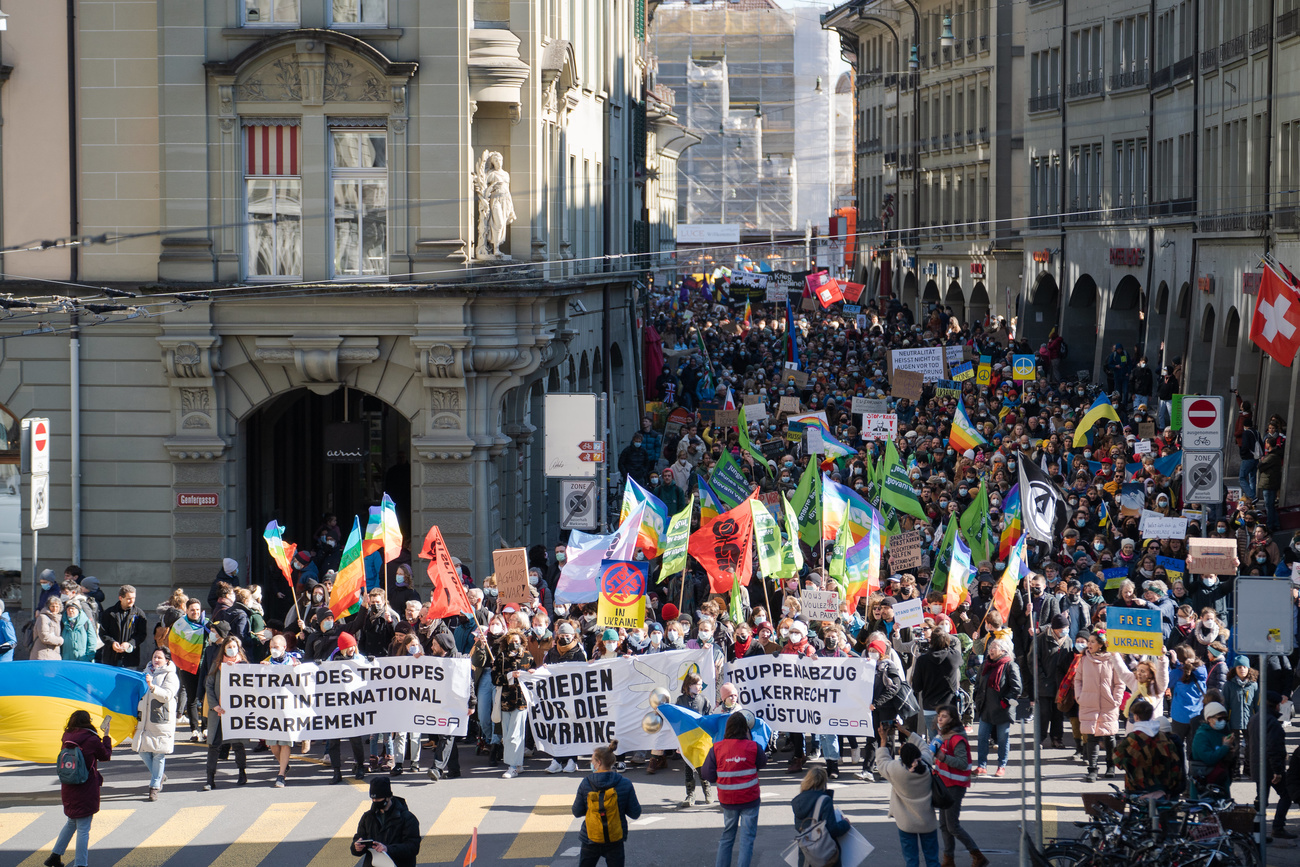
More
Ukraine: Up to 20,000 people march in Bern for peace
‘Scandalous’
The Süddeutsche Zeitung in Germany was also unimpressed, calling Switzerland’s failure to fully adopt EU sanctions “scandalous”.
“Switzerland is not a small, unimportant player in this conflict – even if it sometimes pretends to be,” it said in an editorialExternal link published on Friday.
“It occupies a key position, especially among the Russian elite, who also visit the Alpine state for important medical procedures or to spend exclusive holidays in Geneva, Graubünden or the Bernese Oberland. The Swiss government therefore has some leverage with which it can hit the Russian rulers hard,” it wrote.
The EU rebuked Switzerland on Friday for not having sanctioned Russia in response to its invasion of Ukraine, news website Politico reportedExternal link.
“This is the biggest threat to European security and stability since the end of the Second World War. And it affects not only Ukraine, it affects Europe – and it doesn’t mean European Union: it affects Europe. Switzerland is part of Europe,” European Commission spokesperson Peter Stano told media in Brussels.
“So we expect our partners, our neighbours, our ally, to follow suit in standing up for defending the principles on which our communities and our countries are based. Among those principles are respect for international rules, protection of democracy and solidarity,” he said.
It also noted that the Swiss government had clearly condemned the Russian invasion of Ukraine, and it was therefore “all the more surprising” that the government had decided “against fully exploiting its potential in this regard”.
“Of course, the EU sanctions can also be criticised and judged as insufficient. Nonetheless, Switzerland has made it clear with its special path that it would prefer to withdraw from this blatant breach of international law – while in other cases, Belarus or Syria for example, it has simply joined the EU. This is scandalous and, by the way, can’t be explained by Switzerland’s neutrality and potential role as a mediator,” it said.
“It is now a matter of building up as much pressure as possible to stop violence and war crimes. The ‘channels of dialogue’ that Switzerland wants to keep open, which the government again emphasised on Friday, are of little interest right now. Instead, those people who have been sanctioned can currently still withdraw their money from Switzerland and possibly put it into the war. Switzerland should think carefully about whether its commitment is appropriate for this war.”
Swiss Solidarity has launched a fundraising campaign to help cope with an expected humanitarian crisis in Ukraine. Donations can be paid via postal account 10-15000-6, adding the words “Crisis in Ukraine”.
In a first phase, the money will be used to help refugees in countries neighbouring Ukraine, notably in Poland. Swiss Solidarity works with charities and aid organisations, including Caritas, HEKS/EPER, the Swiss Red Cross, Helvetas, Medair, Médecins Sans Frontières and the Terre des hommes foundation.
If possible and if necessary, aid projects will also be supported in Ukraine.
The money goes exclusively towards humanitarian aid.
Swiss SolidarityExternal link is an independent foundation. It was born from a programme by the French-language public radio and is now the humanitarian arm of the Swiss Broadcasting Corporation, the parent company of SWI swissinfo.ch.

In compliance with the JTI standards
More: SWI swissinfo.ch certified by the Journalism Trust Initiative









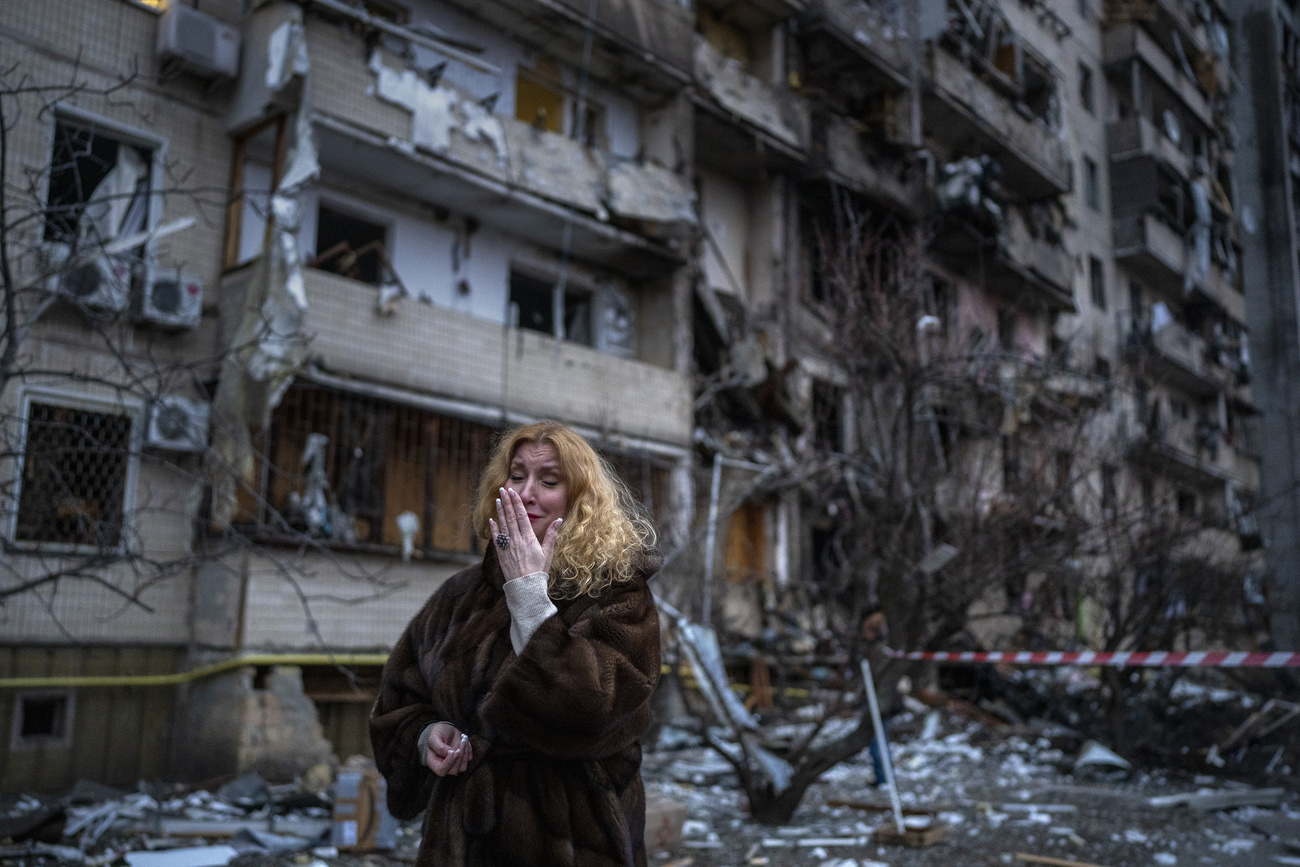

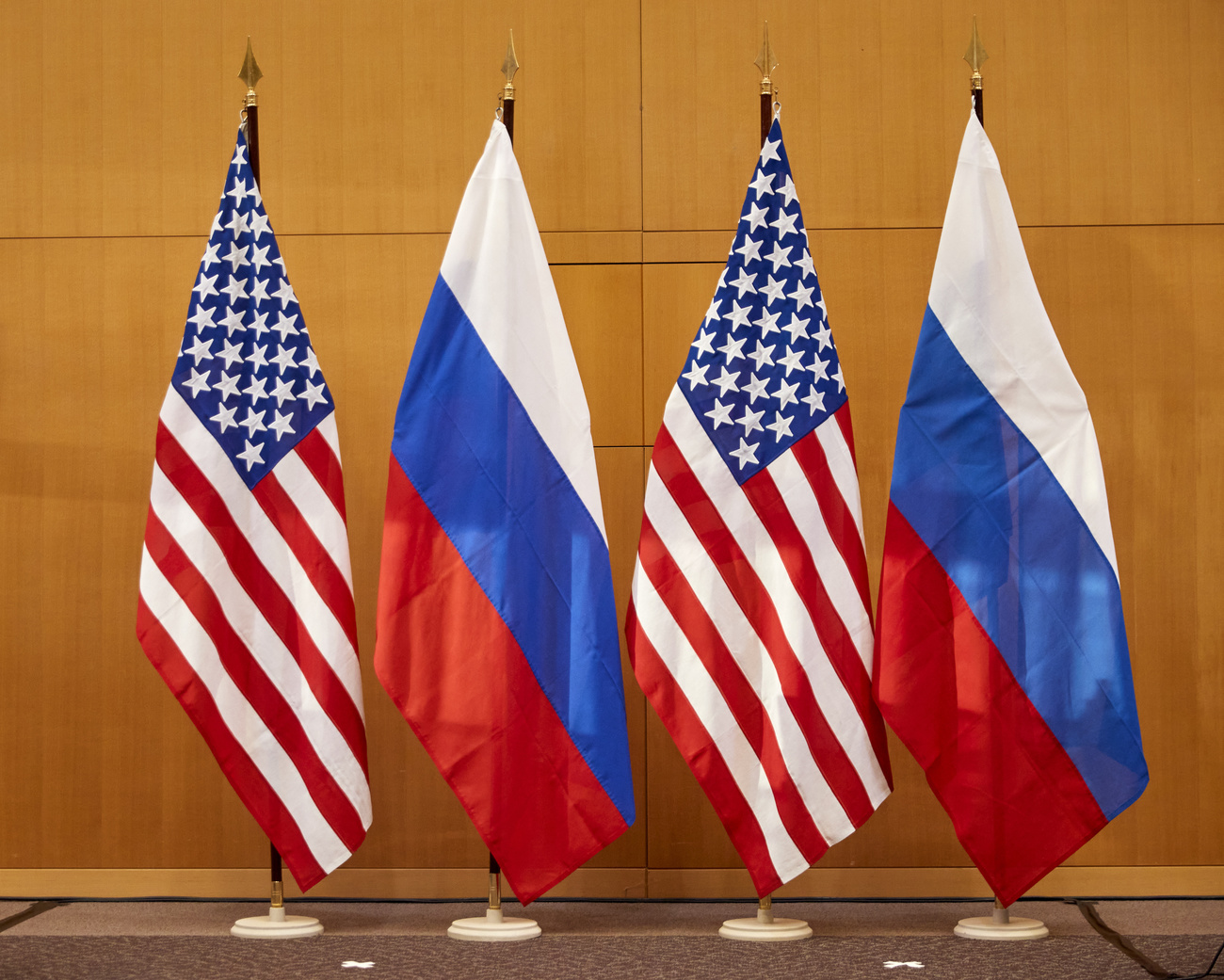

You can find an overview of ongoing debates with our journalists here . Please join us!
If you want to start a conversation about a topic raised in this article or want to report factual errors, email us at english@swissinfo.ch.